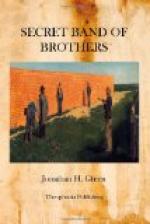Respectfully yours, &c.,
O.E. MORRILL, Chaplain.
No. 2.
From the Christian Advocate
and Journal.
GREEN’S FIRST VISIT TO AUBURN STATE PRISON.
Doctor Bond:—
Dear Sir,—I shall be happy to contribute to your valuable sheet the following communication:
I visited the Auburn State Prison, upon the morning of the 4th instant, accompanied by the Boston Quartet Club, better known in New York city than in this region for their valuable services in calling out so many thousands to hear the eloquence of John B. Gough, in behalf of temperance. We passed through the different workshops of the prison, where many hundreds are doing the different labours allotted to them by their agents. The health of the prisoners is as good, and spirits better than any institution I have ever visited. Though the gloom of the prisoner was not made manifest by his haggard countenance, yet I could not prevent the melancholy reflection, that every heart knew its own sorrow. I have seen much of human depravity in this wicked world—I have felt the sensitive nerve made like an ice-drop by the cold finger of scorn—I know how to sympathize with the child of circumstances—with the heart-broken parent, whose pale, care-worn cheek but too plainly speaks, “We feel trouble, but ye know it not.” How many friends and relatives are now bemoaning the loss of that boy who was once the pride of all that knew him in the days of his affluence! Rising eight hundred souls are now confined in the Auburn State Prison; and as my thoughts expanded in their melancholy train, I asked myself, Who are to blame for all the crimes committed, and which have incarcerated so many human beings? I answered by referring to my own sad experience. By the carelessness of the parent or guardian, the bud is nipped before the blossom puts forth, and should it not scatter its leaves to the four winds, it cannot fail to produce evil fruit. With these sad feelings, I wended my way through the prison, which speaks well to the praise of the different agents placed there to conduct the working departments.
On my return to the prison office, I was introduced to the chaplain, Rev. O.E. Morrill, which reverend gentleman informed me that a man by the name of Wyatt, then confined in one of the cells for the murder of Gordon, on the 16th of March, in the Auburn State Prison, had confessed to him that he had lived a gambler several years in the south and west, and he would like I should call upon him. I accompanied him to the cell of the murderer. The door was thrown open upon its grating hinges, when the reverend gentleman introduced me as an acquaintance of his who had travelled south several years, and thought that he (Wyatt) would be glad to converse with him. He said he was happy to see me, and asked me to be seated. After a short discourse, relative to the different classes of men then in confinement, I asked him what he followed




